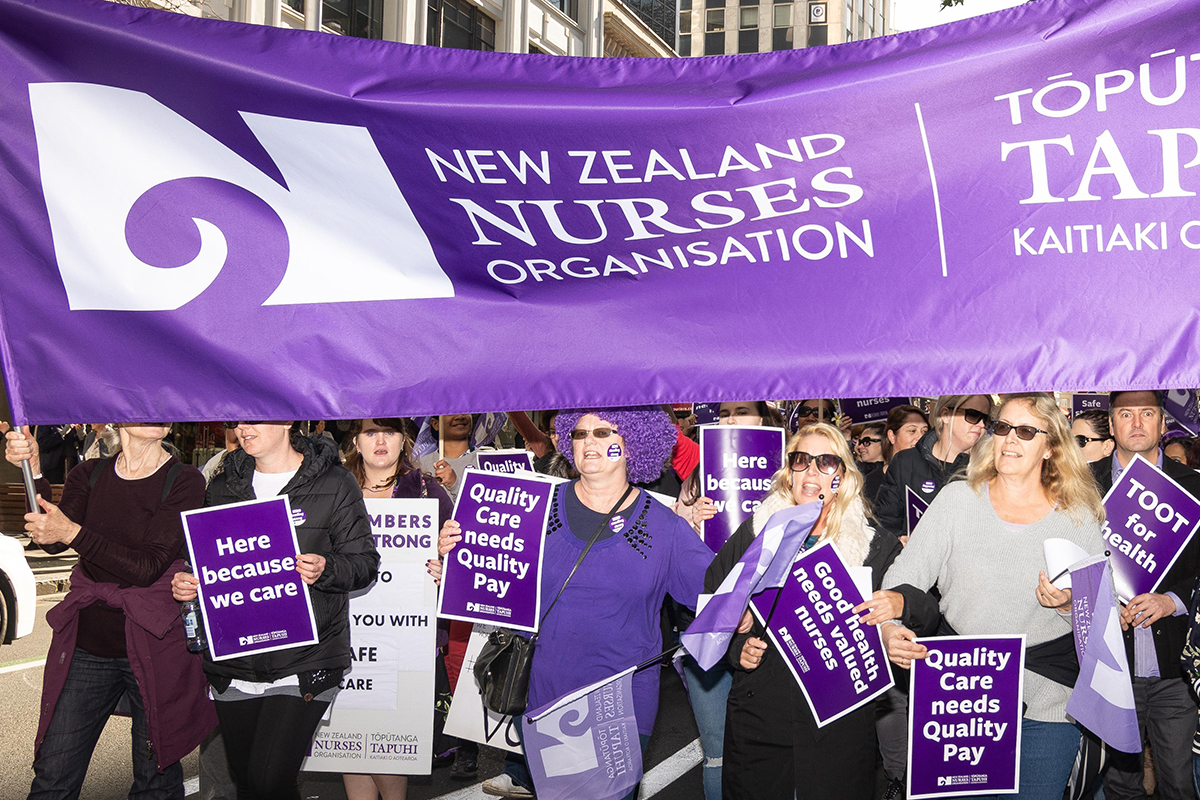NZ nurses are set to strike on June 9 for eight hours. Not a step lightly taken. BayBuzz asked Clare Buckley, Head fo Nursing at EIT’s School of Nursing for her perspective on the state of the profession. We’d welcome readers’ views on the situation.
Kia ora koutou katoa,
Just a year ago, I was writing of my love of nursing and my concern for the issues that the profession was facing – including falling numbers of new nurses, an aging workforce, poor pay and conditions, and the national and global threat of Covid-19.
What has happened since then?
I am still passionate about nursing and love the work and career I have, and have had.
But, enrolments have not surged, the workforce continues to age, nurses have again voted to strike over worsening conditions and the insulting pay offer made by DHBs, and by November last year over 20,000 health professionals – many of them nurses – had lost their lives to Covid-19. My thoughts and prayers go to all their families.
For us in Hawke’s Bay (and nationally), there is a chronic shortage of nurses, there are not enough nurses to keep up with the Covid-19 vaccine rollout – and this is necessitating a proposed change in the legislation to allow others (including lay people) to administer the vaccine. Demand for health care is increasing. A story on the national media spoke of 188 presentations to the Hawke’s Bay Regional hospital ED in one 24 hour period – a record (and incidentally some 60 presentations higher than just 10 years ago).
There are also national changes afoot. The Government has passed legislation to disestablish the polytechnic network and has created Te Pūkenga, a mega polytechnic covering the entire national network. Whilst EIT remains as an education provider in Hawke’s Bay, the name and branding will go, and become a subsidiary or delivery site of Te Pūkenga. The Government has also signalled a move to disestablish all the DHBs and create a mega health entity – Health NZ.
Will this be good for Hawke’s Bay, for nursing, and for health in general?
The jury is out. So far, we risk losing regional influence in nursing education, and this could also be true for health delivery. We need to make sure that the people of Hawke’s Bay retain their voice and we do not become passive recipients of the Government’s grandiose and centralised plans for our education and our health.

But back to nursing – my passion!
I believe that the challenge for us is to bring the perception of nurses and the profession of nursing crashing into the 21st century. ‘Nurse’ is such a very small word – and one that everyone thinks they understand. But my concern is that we do not understand it. Rather, we are we still mired in the Florence Nightingale era, believing that nurses are young women who are selfless deliverers of care – usually at the behest of doctors
Thankfully, we are not just that person or that profession anymore. We are so much more.
First and foremost – we are educated, not trained.
Because of this, we are critical thinkers who make health-care decisions based on assessments that are underpinned by knowledge and expertise. Of all the health professions, nurses spend the most time ‘at the bedside’ and with patients and their whānau. Think about your last trip to the hospital – I bet you saw the doctors once a day for a few minutes. How often did you see or speak with a nurse?
With additional education, nursing practice extends nurses to becoming fully autonomous practitioners. Nurse Practitioners enrol patients, review, assess, order tests, diagnose, treat, and prescribe medications – exactly as GPs do. Even Florence would be stunned by these developments. We do not work under or at the behest of doctors – we work alongside them, and enjoy mutually respectful relationships.
And where do we find nurses? Not just in hospitals or in GP practices, that is for sure! We are in the air flying critically unwell patients between centres, and we are out at sea on deep sea oil rigs and on cruise ships. Nurses are down mines working in Occupational Health and Safety roles and they are in refugee camps and on mercy ships around the world.
If you think you know nursing, think again. And think about this amazing profession and people. Yes we are selfless carers, but we are also so much more than that.
As nurses make the very difficult decision to strike, please do not pillory them for putting themselves and their worth first. We spend our lives caring for others and have devoted many years to our foundational and on-going education. Please allow us to be valued – both as health professionals, and as a well-remunerated profession that reflects our education, skills, and contribution to the health and well-being of the nation.
Ngā mihi nui
Clare Buckley
Head of School – Nursing
EIT


Well written Clare.
I am a retired RN/Midwife. I spent over 50 years in the profession, not just NZ, but in other parts of the world. I believe I have the background to comment.
Nurses in NZ are simply not valued, and a big part of the problem is that there are STILL too many good souls who think that nursing is a vocation that does not equate with money.
Until these lovely people can be persuaded to raise the flag with the ones that strike, nothing will be achieved.
At least the wages should match those being offered in Australia, which would hopefully arrest the brain drain.
Good luck.
Many thanks Kaye – clearly, I couldn’t agree more, but thank you so much for sharing your voice!
There are over 1000 Dental Surgeons registered in NZ who could give C19 injections. Another untapped workforce is School Dental Therapists.